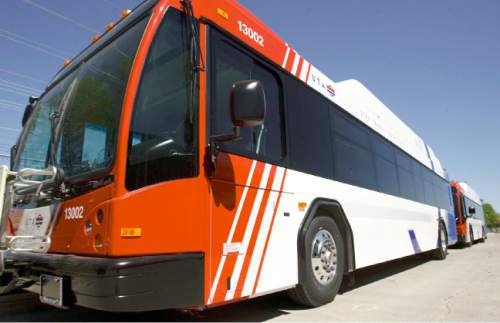This is an archived article that was published on sltrib.com in 2015, and information in the article may be outdated. It is provided only for personal research purposes and may not be reprinted.
Utah shows how investing in mass transit can yield big returns and offers the sort of story that could persuade Congress to increase funding for rail projects, state leaders told 1,200 national transportation managers gathered Monday in Salt Lake City.
Utah Transit Authority officials, Gov. Gary Herbert, Salt Lake City Mayor Ralph Becker and Utah House Speaker Greg Hughes, delivered that message to the rail convention of the American Public Transportation Association at the Grand America Hotel.
"Salt Lake City is a true success story," Michael Melaniphy, association president and CEO, said listening to them. His group last year named UTA the top transit system in North America. "These are the stories we need to bring back to Congress."
Michael Allegra, president and CEO of UTA, told the group, "We pledged to build 70 miles of rail transit in seven years or less. We actually got it done in five years," and $300 million under budget, as it extended FrontRunner to Provo and TRAX to Salt Lake City International Airport, South Jordan, West Valley City and Draper. Becker said the new Sugar House streetcar has attracted $400 million in investment nearby in its first year of operation. However, ridership there is only about a third as high as projected in an application that helped the project win a $26 million federal grant.
"Rail has been a catalyst for renewing an historic neighborhood into a thriving place to work, live and play," Becker said. "We have seen an incredible return on investment in the surrounding neighborhood."
Becker said UTA rail systems have been essential to handling growth in other areas, too.
"We could not be the city we are today without the rail network moving a quarter of our employees every single day" to the central business district "and nearly a third of our University of Utah faculty, students and staff."
He added, "Rail has reduced traffic. It's kept our air quality from degrading."
Herbert told the group that Utah has perhaps the hottest economy in the nation, and good transportation planning and aggressive construction played a key role.
"The business community was very loud and clear in saying if you want to prosper economically in this state, we need to have a transportation system that works," he said. "Certainly our UTA, our rail-transportation system that we've developed here, is a big part of the success that we've had."
Hughes, a former UTA board chairman, said leaders in other states often ask him how such big government-funded construction occurred in a conservative state. He said officials from all political parties plus business and local governments reached a consensus on what was needed.
"It doesn't have to be a partisan issue," Hughes said. "This is easy. This is low-hanging fruit."
"Don't we all wish that we had bipartisan leadership that could speak so strongly on transit," Melaniphy said after listening to Republicans Herbert and Hughes and Democrat Becker. He praised them for helping UTA achieve a 43-percent increase in rail ridership over the past decade.
Melaniphy noted that the current federal surface transportation law is due to expire at the end of July, but Congress is expected to extend it to the end of the year as it also works on perhaps a five-year extension. He said APTA's top priority is persuading Congress to fund more mass-transit projects in those bills.
"What do we want? Money. When do we need it? Now," he said urging his group to chant along with him. "Public transit, as we have seen here in Salt Lake City and Utah, is a proven economic catalyst," he said. "We need Congress to understand that this is the time to make the necessary investments in our nation's infrastructure." —
UTA team wins 'rail rodeo'
The Utah Transit Authority used home-field advantage Sunday to win first place in the team competition at the International Rail Rodeo sponsored by American Public Transportation Association as part of its convention here.
It combined the top score of "maintainers," who had to trouble shoot problems with rail cars, and operators who had to show knowledge of safety regulations, train equipment, and track right-of-way rules and procedures.
The winning UTA team included Jody Fairbourn, Richard Klein, Logan Parker, JoAnne Sloan and David Wright.



